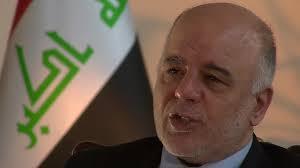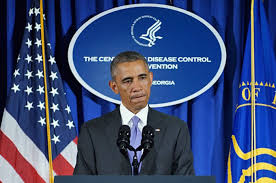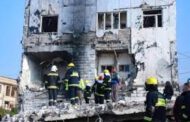Iraqi Prime Minister Haider al-Abadi has told the BBC he “totally” opposes Arab nations joining air strikes against Islamic State in his country.
In an interview, he said Western air power had “filled many gaps” in Iraq’s fight against the jihadist group.
Several Arab states, including Saudi Arabia and Jordan, have joined the international coalition against IS.
Their aircraft have carried out strikes in Syria, but only those from the US, UK and France have hit targets in Iraq.
On Wednesday evening, France said it would send a further three fighter jets and a warship to the Gulf to support the fight against IS.
According to the French military, the Rafale jets would be deployed in the United Arab Emirates (UAE), bringing to nine the total number of French aircraft operating from a base there.
Talking to the BBC in Baghdad, Mr Abadi said Iraq’s army would defeat IS “if we have good air cover” but stressed that no foreign ground troops were needed.
“We are very clear we will not accept any troops on the ground except Iraqi troops,” he added.
Iraqi government forces had “contained” the existential threat to Iraq posed by IS and removed the danger of an onslaught on Baghdad, Mr Abadi said, but added that he was not “taking any chances”.
He said he was restructuring the army to ensure the protection of the Iraqi public and had asked the UK to help with training, intelligence and technology. Prime Minister David Cameron had agreed to help, he added.
He warned that “international and regional polarisation” had contributed to the rise of IS – which has announced the creation of a “caliphate” in the large swathes of Iraq and Syria under its control – and said he wanted to improve relations with neighbouring countries.
Mr Abadi, a Shia Arab, formed a unity government in September after the resignation of Nouri Maliki, who was accused by Iraq’s minority Sunni Arabs and Kurds of monopolising power and pursuing sectarian policies.
The US-led coalition has conducted more than 230 air strikes on IS positions in Iraq since August. The operation was expanded into Syria on 22 September, since when there have been more than 70 strikes.
Saudi Arabia, Jordan, Bahrain, Qatar and the UAE have participated or contributed to the air campaign in Syria.
Mr Abadi said he had sent a delegation to Damascus to inform its neighbour of Iraq’s request for the coalition to target IS in Syria, saying it was crucial to stop “transient border terrorism”.














